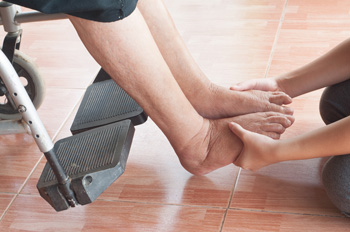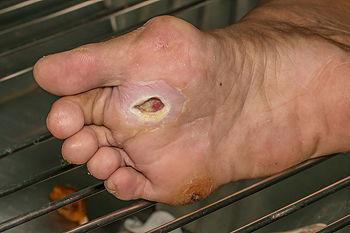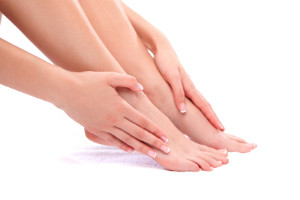Items filtered by date: April 2020
Foot Pain and Morton’s Neuroma
 Morton’s neuroma is an uncomfortable foot condition that may develop for a number of reasons. One common cause of Morton’s neuroma is ill-fitting footwear. Those who wear shoes that restrict or constrain the toes may develop Morton’s neuroma. This condition is caused by a pinch nerve that creates a sharp, burning sensation that can be incredibly painful. Some patients that have had this condition describe experiencing feeling as if they are walking with a pebble stuck in their shoe. Most of the discomfort from this condition is felt in the ball of the foot or toe areas. To help find relief, it may be helpful to wear wider shoes. For professional advice on how to treat this condition, it’s suggested that you consult with a podiatrist.
Morton’s neuroma is an uncomfortable foot condition that may develop for a number of reasons. One common cause of Morton’s neuroma is ill-fitting footwear. Those who wear shoes that restrict or constrain the toes may develop Morton’s neuroma. This condition is caused by a pinch nerve that creates a sharp, burning sensation that can be incredibly painful. Some patients that have had this condition describe experiencing feeling as if they are walking with a pebble stuck in their shoe. Most of the discomfort from this condition is felt in the ball of the foot or toe areas. To help find relief, it may be helpful to wear wider shoes. For professional advice on how to treat this condition, it’s suggested that you consult with a podiatrist.
Morton’s neuroma is a very uncomfortable condition to live with. If you think you have Morton’s neuroma, contact Donald Manger, DPM of Associated Podiatric Physicians, PA. Our doctor will attend to all of your foot care needs and answer any of your related questions.
Morton’s Neuroma
Morton's neuroma is a painful foot condition that commonly affects the areas between the second and third or third and fourth toe, although other areas of the foot are also susceptible. Morton’s neuroma is caused by an inflamed nerve in the foot that is being squeezed and aggravated by surrounding bones.
What Increases the Chances of Having Morton’s Neuroma?
- Ill-fitting high heels or shoes that add pressure to the toe or foot
- Jogging, running or any sport that involves constant impact to the foot
- Flat feet, bunions, and any other foot deformities
Morton’s neuroma is a very treatable condition. Orthotics and shoe inserts can often be used to alleviate the pain on the forefront of the feet. In more severe cases, corticosteroids can also be prescribed. In order to figure out the best treatment for your neuroma, it’s recommended to seek the care of a podiatrist who can diagnose your condition and provide different treatment options.
If you have any questions, please feel free to contact our office located in Hamilton Township, NJ . We offer the newest diagnostic and treatment technologies for all your foot care needs.
Possible Causes of Wounds on the Feet
 It is beneficial for wounds on the feet to be promptly treated. They may occur from stepping on a piece of glass or a sharp object. Patients who are diabetic may endure wounds on the feet, and this may be a result of a condition known as neuropathy that often accompanies diabetes. This condition affects the ability to feel if there are wounds, bruises, or cuts, which may cause them to easily become infected. Minor wounds may be treated by washing and drying the affected area thoroughly, followed by applying a clean bandage over the wound. Severe wounds on the feet may need medical attention, and it is strongly suggested that you seek the counsel of a podiatrist who can guide you toward proper treatment.
It is beneficial for wounds on the feet to be promptly treated. They may occur from stepping on a piece of glass or a sharp object. Patients who are diabetic may endure wounds on the feet, and this may be a result of a condition known as neuropathy that often accompanies diabetes. This condition affects the ability to feel if there are wounds, bruises, or cuts, which may cause them to easily become infected. Minor wounds may be treated by washing and drying the affected area thoroughly, followed by applying a clean bandage over the wound. Severe wounds on the feet may need medical attention, and it is strongly suggested that you seek the counsel of a podiatrist who can guide you toward proper treatment.
Wound care is an important part in dealing with diabetes. If you have diabetes and a foot wound or would like more information about wound care for diabetics, consult with Donald Manger, DPM from Associated Podiatric Physicians, PA. Our doctor will assess your condition and provide you with quality foot and ankle treatment.
What Is Wound Care?
Wound care is the practice of taking proper care of a wound. This can range from the smallest to the largest of wounds. While everyone can benefit from proper wound care, it is much more important for diabetics. Diabetics often suffer from poor blood circulation which causes wounds to heal much slower than they would in a non-diabetic.
What Is the Importance of Wound Care?
While it may not seem apparent with small ulcers on the foot, for diabetics, any size ulcer can become infected. Diabetics often also suffer from neuropathy, or nerve loss. This means they might not even feel when they have an ulcer on their foot. If the wound becomes severely infected, amputation may be necessary. Therefore, it is of the upmost importance to properly care for any and all foot wounds.
How to Care for Wounds
The best way to care for foot wounds is to prevent them. For diabetics, this means daily inspections of the feet for any signs of abnormalities or ulcers. It is also recommended to see a podiatrist several times a year for a foot inspection. If you do have an ulcer, run the wound under water to clear dirt from the wound; then apply antibiotic ointment to the wound and cover with a bandage. Bandages should be changed daily and keeping pressure off the wound is smart. It is advised to see a podiatrist, who can keep an eye on it.
If you have any questions, please feel free to contact our office located in Hamilton Township, NJ . We offer the newest diagnostic and treatment technologies for all your foot care needs.
Foot Pain Can Be a Common Ailment
 Research has indicated it is likely that many people will experience some type of foot pain during their lives. The foot is a complex structure, and each foot consists of twenty-six bones, in addition to numerous tendons and ligaments. The function of the ankle is to connect the lower leg to the foot. Patients who frequently participate in running and jumping activities may increase their chances of incurring a foot injury that can create a misaligned foot structure and cause foot pain. An Achilles tendon injury may cause considerable pain in the calf and heel area. This can happen if it becomes torn or overstretched, and may be common among athletes. Morton’s neuroma is considered to be a form of nerve pain, and typically affects the ball of your foot. If you are experiencing any type of foot pain, it is strongly suggested that you are under the care of a podiatrist.
Research has indicated it is likely that many people will experience some type of foot pain during their lives. The foot is a complex structure, and each foot consists of twenty-six bones, in addition to numerous tendons and ligaments. The function of the ankle is to connect the lower leg to the foot. Patients who frequently participate in running and jumping activities may increase their chances of incurring a foot injury that can create a misaligned foot structure and cause foot pain. An Achilles tendon injury may cause considerable pain in the calf and heel area. This can happen if it becomes torn or overstretched, and may be common among athletes. Morton’s neuroma is considered to be a form of nerve pain, and typically affects the ball of your foot. If you are experiencing any type of foot pain, it is strongly suggested that you are under the care of a podiatrist.
Foot Pain
Foot pain can be extremely painful and debilitating. If you have a foot pain, consult with Donald Manger, DPM from Associated Podiatric Physicians, PA. Our doctor will assess your condition and provide you with quality foot and ankle treatment.
Causes
Foot pain is a very broad condition that could be caused by one or more ailments. The most common include:
- Bunions
- Hammertoes
- Plantar Fasciitis
- Bone Spurs
- Corns
- Tarsal Tunnel Syndrome
- Ingrown Toenails
- Arthritis (such as Gout, Rheumatoid, and Osteoarthritis)
- Flat Feet
- Injury (from stress fractures, broken toe, foot, ankle, Achilles tendon ruptures, and sprains)
- And more
Diagnosis
To figure out the cause of foot pain, podiatrists utilize several different methods. This can range from simple visual inspections and sensation tests to X-rays and MRI scans. Prior medical history, family medical history, and any recent physical traumatic events will all be taken into consideration for a proper diagnosis.
Treatment
Treatment depends upon the cause of the foot pain. Whether it is resting, staying off the foot, or having surgery; podiatrists have a number of treatment options available for foot pain.
If you have any questions, please feel free to contact our office located in Hamilton Township, NJ . We offer the newest diagnostic and treatment technologies for all your foot care needs.
Runners and Walkers Have Different Needs in Shoes
 There are known differences between walking and running shoes. The type of shoes that runners typically prefer consist of having additional flexibility, which is needed as a result of strong impact on the ground. People who enjoy walking may benefit from footwear with less padding in the heel and arch areas of the feet. Additionally, walking shoes can offer more support than running shoes. They have firmer soles which may help to make walking more comfortable. If you are interested in learning about additional details of the differences between walking and running shoes, please consult with a podiatrist.
There are known differences between walking and running shoes. The type of shoes that runners typically prefer consist of having additional flexibility, which is needed as a result of strong impact on the ground. People who enjoy walking may benefit from footwear with less padding in the heel and arch areas of the feet. Additionally, walking shoes can offer more support than running shoes. They have firmer soles which may help to make walking more comfortable. If you are interested in learning about additional details of the differences between walking and running shoes, please consult with a podiatrist.
For more information about walking shoes versus running shoes, consult with Donald Manger, DPM from Associated Podiatric Physicians, PA. Our doctor can measure your feet to determine what your needs are and help you find an appropriate pair of footwear.
Foot Health: The Differences between Walking & Running Shoes
There are great ways to stay in shape: running and walking are two great exercises to a healthy lifestyle. It is important to know that running shoes and walking shoes are not interchangeable. There is a key difference on how the feet hit the ground when someone is running or walking. This is why one should be aware that a shoe is designed differently for each activity.
You may be asking yourself what the real differences are between walking and running shoes and the answers may shock you.
Differences
Walking doesn’t involve as much stress or impact on the feet as running does. However, this doesn’t mean that you should be any less prepared. When you’re walking, you land on your heels and have your foot roll forward. This rolling motion requires additional support to the feet.
Flexibility – Walking shoes are designed to have soft, flexible soles. This allows the walker to push off easily with each step.
If you have any questions, please feel free to contact our office located in Hamilton Township, NJ . We offer the newest diagnostic and treatment technologies for all your foot care needs.

